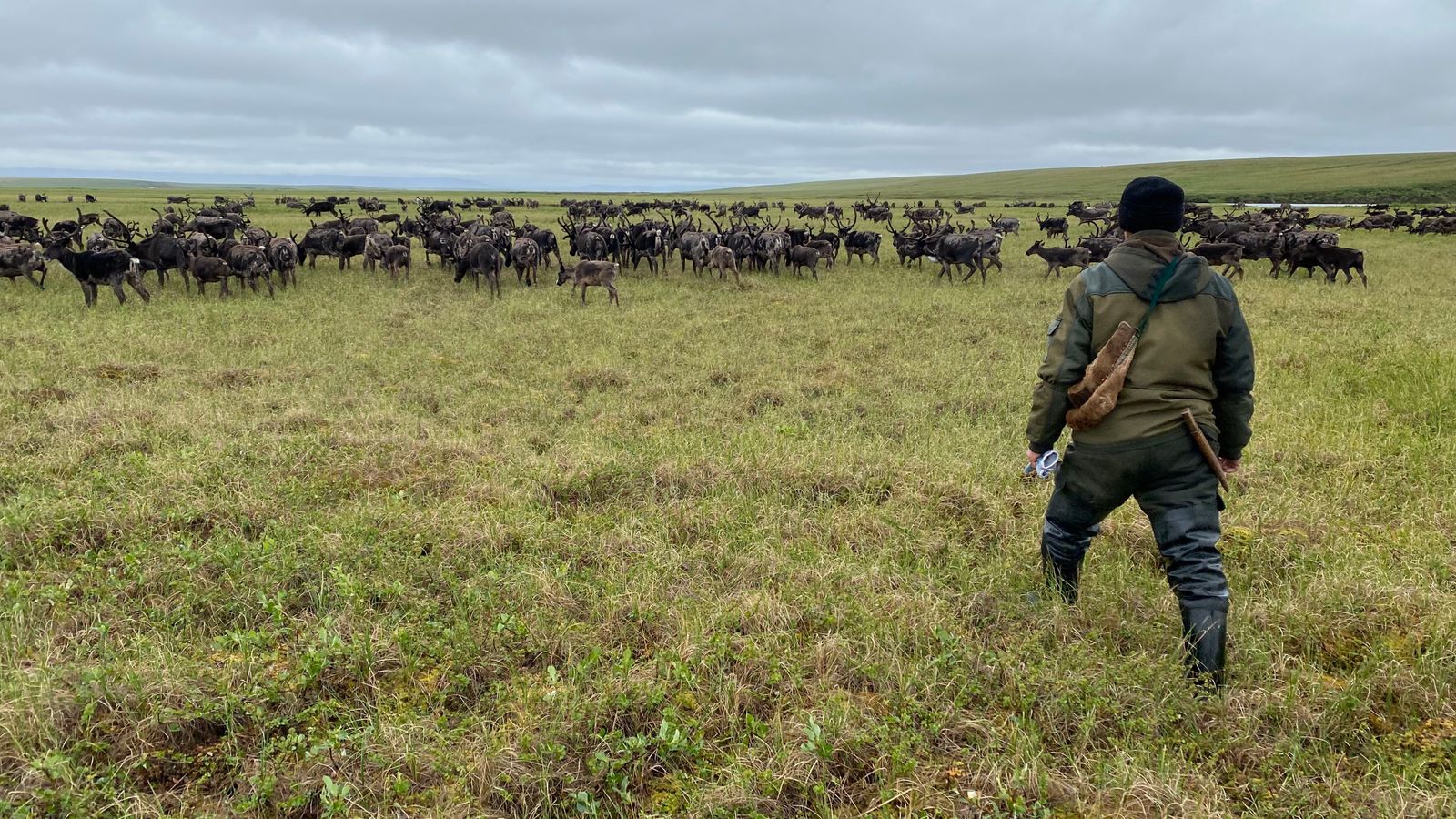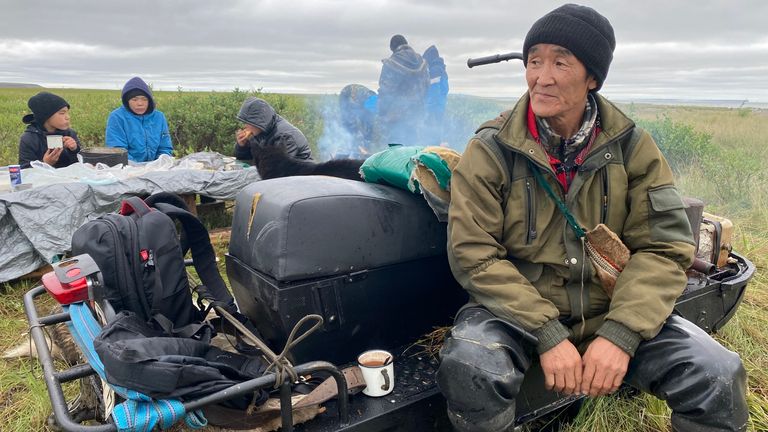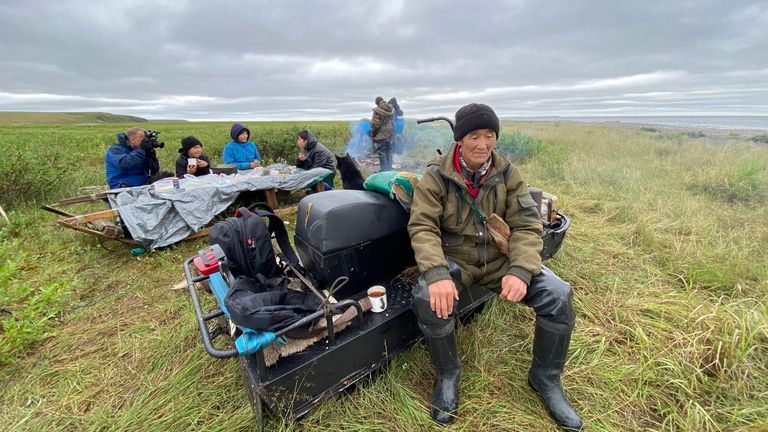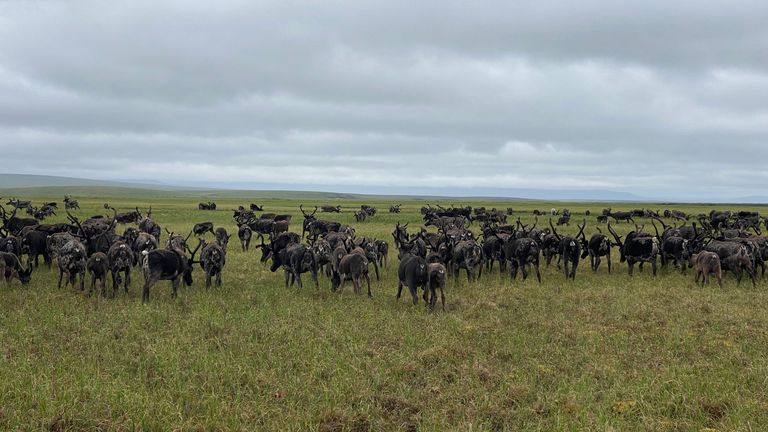Slava Kemlil is waiting for us on the dock in the Arctic town of Chersky.
He’s been there applying for government grants but it is not where he feels at home. Home is in the tundra with his reindeer. “You can relax there,” he says. “You can breathe the fresh air. In the settlement there are four walls and a lot of paperwork.”
Kemlil belongs to the Chukchi nation from Chukotka in the Russian Far East. They are an Arctic people and roughly divide in terms of traditional livelihoods between reindeer herding chukchis and sea chukchis who fish. Kemlil is of the first order but as proficient at sea as the second, guiding our boat deftly past shallow sand banks to dock at the small camp on the shore of the Kolyma river where his team are waiting.
They’re a group of nine, some of them experienced reindeer herders, the rest teenagers on summer placement sent by the local employment centre.
It’s a tough job. Shifts are 12 hours long, two herders at a time. Temperatures can drop to -55C (-67F) in winter and reach 30C (80F) in summer when mosquitoes keep the herd constantly on the move.
“It is in our blood since the dawn of time to be able to survive in such conditions,” Kemlil says.
It is a way of life bound to nature’s pulse. Kemlil lists the ways in which he has noticed changes to the tundra environment since he was young, shifts he attributes in part to man-made climate change. New lakes appearing or disappearing as the permafrost thaws, forcing the reindeer to adopt new migratory routes; less fish in the rivers; fawning season starting 10-15 days earlier with the earlier spring.
Then he backtracks slightly. “The old people used to say that it happened before. Sometimes it gets colder, then it gets warmer. That’s the course of nature.”
Warmer winters though have their drawbacks. More frequent rain and intermittent thaws mean icy crusts form on the snow which damage the reindeer’s hooves and muzzles as they forage for food. Kemlil has had to cull large numbers as a result. Lame animals would slow the herd.
“When such periods come the reindeer lose their fat, they waste all their energy on hoofing the snow. Sometimes you can hear them from far away, it sounds as if they are stomping ice or something very hard. So you have to inspect the routes very carefully to find the soft snow.”
The worst incident this year was when a pack of forty wolves attacked the herd, encircling 100 reindeer and separating them from the rest. That was the last the herders saw of them.
But climate change is bringing larger predators closer too.
Shrinking sea ice means polar bears are coming to the Russian mainland especially around Chukotka in search of food.
Two summers of Arctic wildfires have driven brown bears closer and they are difficult to spot, especially at night. “It’s getting harder,” Kemlil says.
The teenagers are incredibly polite. They keep the kettle filled and the tea coming and wait for permission to start eating. They are smiley and enthusiastic. They seem to be enjoying life on the tundra.
Katya Protoppopova is the only girl in the group. Her mother is Chukchi and grew up on the tundra, her father is Russian.
“I came here to earn money to buy a ticket for myself and go study. I might come back next summer as I like it but I don’t have plans to stay.”
She and some of the other teenagers film us on their phones as we interview Kemlil. It seems a strange juxtaposition against the backdrop of the tundra, so far from reception or any other hints of modernity but clearly no self-respecting teen would be without their phone.
Subscribe to ClimateCast on Spotify, Apple Podcasts, or Spreaker
“The world is being widely computerised and it is very difficult to live in this world, especially for the young people”, Kemlil sighs. “They can’t live without technology. We need to try to adapt to this modern world, match it step for step.”
For all the nuances of the shifts in climate and how those play out on the tundra, it is this which seems to worry him most, the eternal question of how to make the young stay.
“From times immemorial our forefathers were breeding reindeer and we try to keep this industry going to make sure it doesn’t disappear in our modern world. The young ones are not quite willing but we do our best.”




